
Haiti
It’s sometime in 2005 or 2006 and my wife and I are casually sitting at home one evening. Out of nowhere, I looked at Pat and said “We should visit an orphanage in Haiti.” I have no idea from where the thought came but found the idea intriguing. Soon thereafter, I picked up a magazine showing an article stating that Haiti was the most dangerous country to visit in the world. I quickly placed the prospect of visiting there on the back burner.
Then I saw a newsletter at our church from an orphanage in Port-au-Prince and, once again, became interested. I sent my email address for future updates to satisfy my curiosity. Their newsletters would often feature one particular orphan and give his or her background and other pertinent info. In 2007, a newsletter featured a young man named James and I was stricken. He was a fine-looking young man and I wanted to learn more about him. I emailed the orphanage and learned he had no idea who his parents were and had lived his entire life in various orphanages. I told Pat that we should plan a trip to Haiti to meet James and learn more about the orphans of Haiti.
We decided to visit that same year during the week between Christmas and New Year. I contacted the orphanage to confirm our visit and booked our flights.
I had no idea the impact the trip would have on us.
We, in America, take many things for granted. We are a blessed, but spoiled people. While we work hard for what we have, life without running water, electricity, and a place to sleep is beyond our imagination. We have our warm, cozy homes, a nice car, supermarkets filled with an endless supply of food, stores with an unnecessary amount of choices of products and governmental protection and services to keep us safe and secure. Haiti was the antithesis of our life in America.
We were picked up at the airport at Port-au-Prince for our ride to the orphanage. Riding through the city, I was astounded at the poverty conditions. Every item imaginable was being sold on the sidewalks from live chickens to motor oil. Young children were constantly running up to our car asking for handouts. We learned that parents from the surrounding countryside send their small children to Port-au-Prince to beg for food or money. Many are taught to perform sex acts for money. It was a heartbreaking experience to see these kids on the streets.
The streets of Port-au-Prince are chaotic, to say the least. No one pays attention to lanes while driving (there, of course, are no painted lanes) and drivers make their own way to get to their destinations as quickly as possible. Left side, right side; it doesn’t make any difference where you drive as long as you keep moving. If a car breaks down, they jack it up in the middle of the street and begin repairs. No AAA in Port-au-Prince.
At one point, we stopped in downtown Port-au-Prince to do some food shopping. We, Americans, were not allowed to bargain for anything as the Haitians would surely inflate their prices. I tried to take a picture of some people selling goats and chickens on the side of the street and was quickly repelled. Apparently, they didn’t want me to take a photo of their animals.
As Pat and I lay in bed that night, tears flooded our eyes as to what we had witnessed. How could life be so cruel and unfair to some people and a blessing to others? We affirmed our desire to share what we had been given with those less fortunate.
We arrive at the orphanage greeted by smiling, excited children ranging in age from 4 to 16. They seem to be happy and well cared for. The housing is adequate and the children are blessed with three meals a day and general care for their needs. Being a Christian orphanage, they are also taught about Jesus. Our hearts were truly touched listening to the kids singing in Creole. They were joyous children and were blessed to be in a loving, caring environment.
Our first trip was a week and we spent time getting to know the kids. We, of course, met James and enjoyed learning about his background. James and several of his friends were in an orphanage operated by a pedophile when they were very young. While none of them remember being abused, they learned to survive by fighting for food and defending themselves as necessary. The family who started the orphanage we were visiting, came from California several years ago and rescued the boys from the pedophile’s orphanage. They, as a family, moved to Haiti to rescue and care for abandoned children. Their lives were a testimony of sacrifice and compassion for the less fortunate.
Haiti’s government was so inept that they were unable to police destructive behavior in orphanages and consequently many children are sexually abused on a regular basis. It’s a very sad, disturbing situation.
Voodoo is common in Haiti. One of the adult workers at the orphanage used to have a company that installed communications systems in homes and businesses. He told us that he was working in the house of the most popular voodoo doctor in Haiti. This doctor was known worldwide and people would come from all over for his services. While they were working in his house, the doctor was having a voodoo session with a customer. The housekeeper began screaming and running around the house as the doctor sought to restrain her for the ceremony. As it turned out, she was to be the human sacrifice for the doctor’s client. It’s hard to imagine that this sort of thing goes on in our world.
As our week ended, we reflected on what we had seen and experienced. Coming from an affluent and blessed country, we felt the desire to share what we had with some of the youth of Haiti. We wanted to bring James to America in hopes of giving him a better chance at a productive and prosperous life. We learned that it was virtually impossible to get visas for kids to leave Haiti, especially young men. The US Immigration believed that once a Haitian got to the US, they would never go back to Haiti and become an illegal alien in America. As we talked about James, we decided to include two of his friends so he wouldn’t feel alienated from being alone in the US. We decided to bring Alex and Jojo out too. Alex and James were like brothers and had been together from very early in their lives. Jojo was a smart young man and I know he would be very successful in America.
We researched our options and learned that we could possibly get them out with student visas. So we began researching US Immigration approved schools in which to enroll them. The boys were 15 when we met them and had a 6th-grade education level from their Haitian school. Our challenge was to get them accepted in an American school given their age and education level. It was no easy task. A Christian school in Bethlehem PA was compassionate but declined acceptance due to their education level and lack of English proficiency.
Further research showed that the Berlitz Language School was an approved school for a student visa so we drove to Princeton NJ to meet with them and see if Berlitz was a viable option. They were most gracious and told us the only location that could offer the proper program was the Berlitz in Manhattan. They had a 12 week course which was acceptable to US Immigration. We obtained and completed the proper applications and prepared for the next step.
Endless government forms, letters of recommendation and our personal financial records were prepared for Immigration as well as proof of funding to support the boy's venture in the US. We applied for a 4-month visa and remain hopeful.
With US Embassy appointments in Haiti and paperwork in hand, I flew to Port-au-Prince in December 2009 excited about the prospects of giving three young men a chance at a better life.
Our appointment with US Immigration In Haiti was at 7am the day after I landed. The orphanage director, three boys and myself arrived at 6am to get a good position in the line that forms in front of the Immigration office. We were all nervous, not knowing if our efforts were in vain. Bill, the orphanage director, was probably the least hopeful as he had tried to get kids out of the country on several occasions. While he was supportive, he had his doubts.
Only the three boys were allowed past the security gate so Bill and I had to wait in the car. An hour, which seemed like a day, passed and no word. Then, all of a sudden, Jojo came running out of the building looking for us. He said they wanted to speak with me so I followed him into the agent processing our application. She questioned me on some of the information I had supplied including verification of my income, etc. and seemingly wanted confirmation that I was real and who I said I was.
Satisfied, she stamped the applications, APPROVED! We were ecstatic and somewhat in shock.
The next morning saw James, Alex, Jojo and me on a flight to Ft Lauderdale FL and then to NYC. These kids had never been out of Haiti and, of course, never been on an airplane. They were in awe of what was happening to them. A couple of hours later, we were going through customs in Ft Lauderdale the boys were pulled into a separate room until I could verify their legal, visa status.
We boarded our connecting flight to La Guardia in New York and arrived later that night. Pat and her sister, Toni, and her husband Ken greeted us at the airport with joyous smiles and welcoming hugs. Our neighbors in PA had purchased winter jackets for the boys (they didn’t have winter clothing being from Haiti) and with jackets in hand, Pat prepared them for the cold December weather. Our first stop was to view the Christmas Tree at Rockefeller Center and their eyes were as wide and bright as could be. Imagine, what these three boys experienced that night. Coming from a poverty-stricken country and extremely insecure childhood, they were now standing in one of the most affluent, civilized and beautiful places in the world. What an incredible venture!
Later that night, we made our way to our home in Pennsylvania where we had prepared their bedroom with three new beds and all the comforts of home. It was a great day and time to rest.
The next morning, the boys once again had a special treat: snow. They had a great time throwing snowballs and experiencing what they had only seen in movies. The contrast made a lasting impression – from the hard Haitian landscape to a beautiful, white blanket of snow in Pennsylvania.
Since their schooling didn’t start until early January, we decided to take them to our house in Florida for a couple of weeks of fun by the pool. We drove down the next day stopping at our favorite restaurants on the way. We had dreamed of seeing their faces at their first visit to a food buffet as they absorbed the wonder of so much food. We stopped in Virginia at a favorite buffet and ushered the boys inside for their ultimate treat. I took them to the buffet and said, “You can have all you want of anything here. Get a plate and enjoy this wonderful food.”
They promptly went back to our table and sat down. No plates; no food. We were baffled. I asked what the problem was and learned that since they didn’t know what the food was, they were afraid to eat it. They had been raised on chicken, rice and beans most of their lives and unfamiliar food was too much of a mystery for them to try. Fortunately, there was a gentleman and his wife sitting at the adjacent table who had overheard our conversation. He was an African-American and stepped up to help our situation. He took the boys to the buffet and explained some of the food to them and was successful in getting them to try some of the new delicacies. We were grateful for his help.
After a couple of weeks of poolside fun, we headed back to Pennsylvania.
Their program at Berlitz began on the first of January so we started our “shuttle” service to Manhattan. Their classes began at 9 so we left at 6:30 each morning for the hour-and-a-half drive to Manhattan. We drove them in and back to Pennsylvania every weekday for 12 weeks. Since they had 4-month visas, the plan was for them to return to Haiti when the schooling session ended or the end of March.
The earthquake struck Haiti on January 12, 2010 and everything changed.
The US Immigration issued a directive that Haitians who were in the US when the earthquake struck, did not have to return when their visas expired. Needless to say, the boys were delighted at the prospect of staying in the US but our plan and budget did not allow for such a drastic change. We began to discuss our options.
Friends in Florida were familiar with the orphanage and had served there on previous occasions. They were able to offer the boys employment with a contractor in Florida and raised enough money to house them in an apartment for one year. We were most grateful for this new opportunity for our boys and prepared to drive them to Florida in April. Pat drove our truck with a trailer to Florida loaded with furniture we donated to set them up in their new apartment in Davie, Florida. A new phase was beginning for our three Haitian men in America.
They worked hard at their new jobs and were successful at supporting themselves and adapting to their new life in the US. When one job ended, they bravely hit the streets in search of new employment. Their persistence and strong wills kept them going and we were most proud of them.
Today they are still working in the US. They have moved to the Midwest and continue to take advantage of life in America. James and Alex are married with children. JoJo got his CDL and is a truck driver. I am grateful we had the opportunity to help these boys and give them the opportunity to make a good life for themselves.
Our First Trip to Haiti
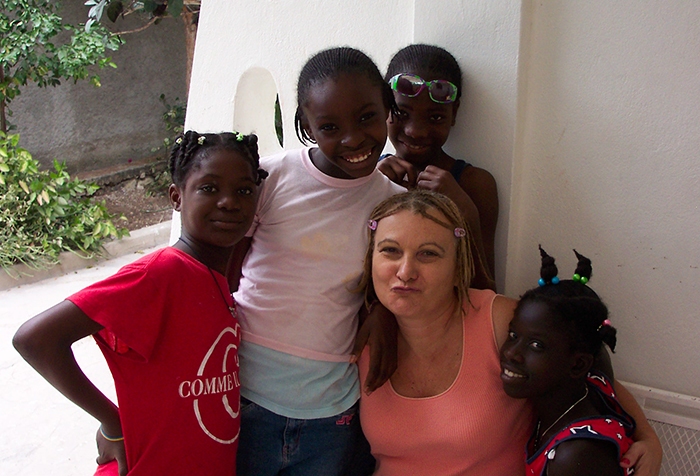
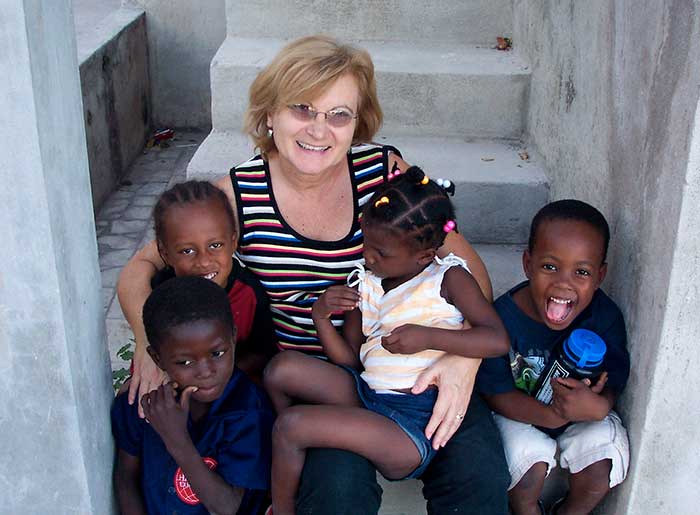

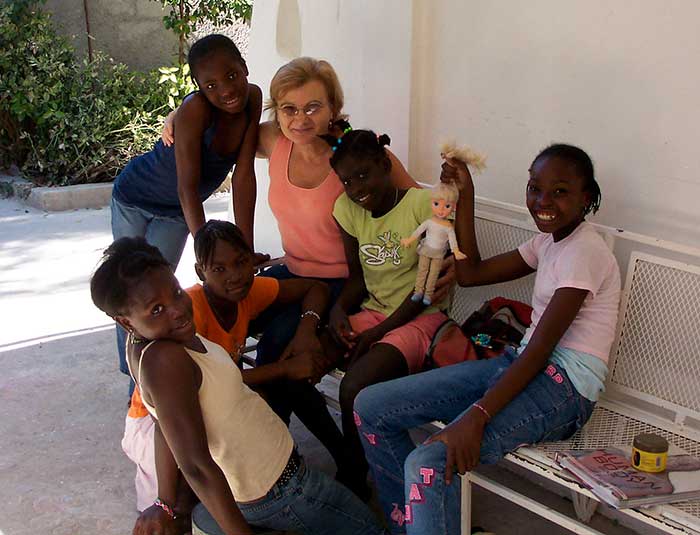

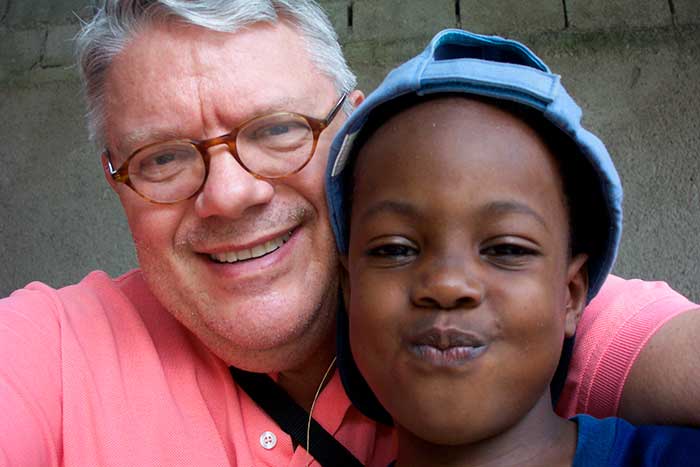
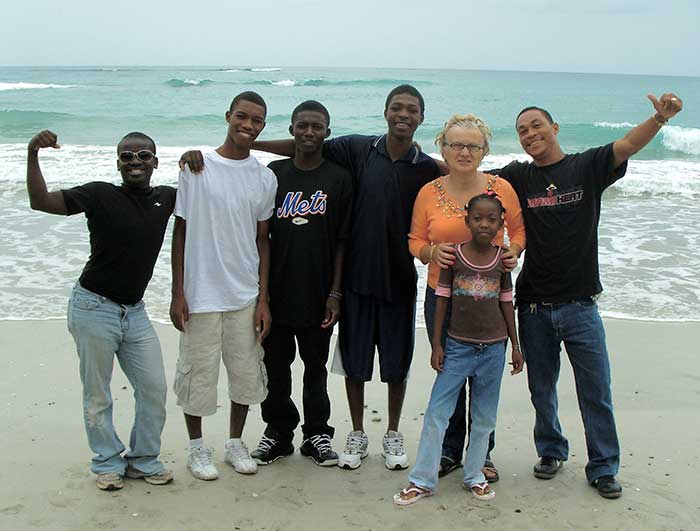
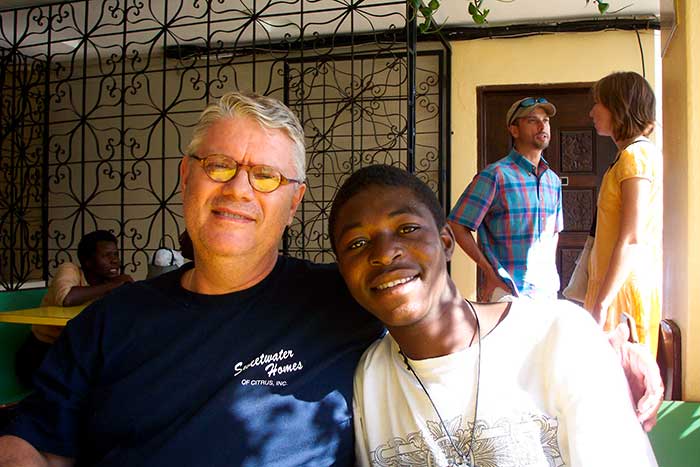
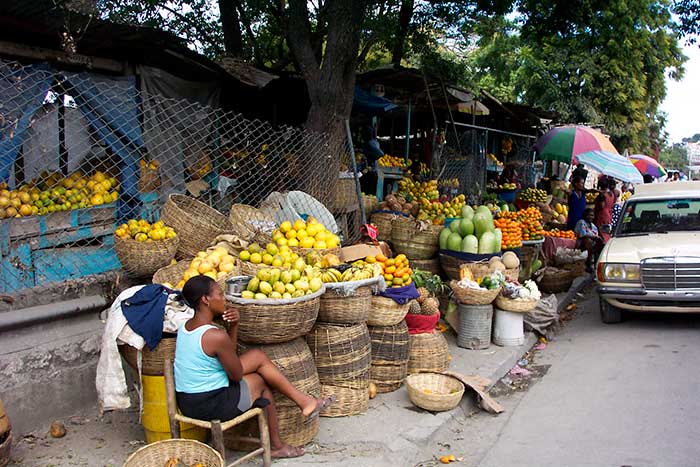
Back to Haiti
My wife, Pat, passed in August 2018 from brain cancer.
I knew that with Pat’s absence in my life, there would be a hole in my heart. I always enjoyed helping people and my mind kept going back to Haiti.
It had been 9 years since we brought the boys to America. I began to reach out to the contacts I had to get an update on the orphanage. I made contact with Fritz who had served as a manager of the orphanage we visited in 2007. He had started his own orphanage and had about 30 kids ranging in age from 2-16. He had no affiliation with a non-profit in the US to raise money. So I decided to start a new non-profit to help support Fritz in Port au Prince.
Child Hope Worldwide Inc was started in 2018 and we began soliciting funds in 2019. To better educate myself on the needs in Haiti, I visited Fritz and the kids in. the summer of 2019. It was a delightful experience meeting the kids and staff of Family Care Haiti. I made 4 trips each time learning more about the needs of Haiti’s orphans. Upon my arrival, I was bombarded by kids expressing their joy and appreciation of my arrival. I got to know many of them and the staff and felt grateful to be able to help them meet their everyday needs.
We would go to Port au Prince shopping for bags of rice and beans, chickens when possible and water. Drinking water was bought in 5-gallon bottles; non-potable water was delivered by trucks and stored in underground tanks. Food was prepared in rustic outdoor kitchens on crude propane stoves. However charcoal is the more popular way to cook food which accounts for the ravaged hillsides on Haiti’s terrain. Small trees are cut to create charcoal never allowing the forest to develop to maturity. Interestingly if you see a satellite map of Hispaniola, the island of Haiti and the Dominical Republic, you can clearly see the border between the two countries. Haiti is brown and the DR is green. Economic hardship has prevented Haitians from using propane to cook vs stripping the hillsides for charcoal.
One would think that because of Haiti’s extreme poverty status that general prices would be low. Unfortunately, general goods, groceries and supplies are just as expensive as in America. Real estate, both purchase and rental prices are also comparable. Sadly employment wages are terribly low and consequently, most Haitians live in poverty situations. A monthly salary of $100-150 is not uncommon for a full-time job.
Port au Prince is home to the world’s largest slum…Cite Soleil. Improvised makeshift huts many made of cardboard are home to thousands of Haitians. There is no running water, septic system or electricity in Cite Soleil. The streets are filled with garbage and it is heartbreaking to see children playing in these diseased, unsanitary conditions.
My desire was to help as many children as possible with direct aid and support through the orphanage. Most of the children in the orphanage were rescued from Citi Soleil. Realizing I could not solve all problems, my motto became….” saving one life at a time”. That in itself was not small task.
My non-profit is Child Hope Worldwide, Inc., dba givenet.org. We continue to process donations for Family Care Haiti in Port-au-Prince, Barr Christian Vocational Center in Uganda and Curtin Child Learning Center also in Uganda.
I invite you to join us in supporting these institutions as they rescue, house and train orphan children. Those of us who are blessed must be a blessing to others.
